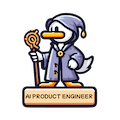🏆 AI Takes Center Stage in Nobel Chemistry Prize

Hello, DuckTypers! Jens here, ready to explore the fascinating world where AI meets chemistry. Let's dive into some groundbreaking news that's shaking up both the tech and scientific communities.
The Royal Swedish Academy of Sciences has awarded the 2024 Nobel Prize in Chemistry, and it's a big win for AI. The prize is shared between David Baker "for computational protein design" and the duo of Demis Hassabis and John M. Jumper "for developing AlphaFold2, which accurately predicts protein structures."
Now, you might be thinking, "Jens, why is this such a big deal for us in the software world?" Well, let me break it down for you:
- It's a significant recognition of AI's impact on traditional scientific fields.
- It highlights the growing importance of computational methods in solving complex biological problems.
- It validates the potential of AI to accelerate scientific discoveries.
What are your thoughts on this, DuckTypers? Do you see this as a natural progression or a surprising turn? Drop your ideas in the comments!
Let's look at a simple pseudocode to understand the basic concept of protein structure prediction:
def predict_protein_structure(amino_acid_sequence):
initial_structure = generate_random_structure(amino_acid_sequence)
for _ in range(optimization_steps):
energy = calculate_energy(initial_structure)
new_structure = perturb_structure(initial_structure)
new_energy = calculate_energy(new_structure)
if new_energy < energy:
initial_structure = new_structure
return initial_structureThis is a simplified version of what AlphaFold2 does at a much more sophisticated level. The real magic lies in how it uses deep learning to make these predictions with incredible accuracy.
🧬 Computational Protein Design: Revolutionizing Biochemistry
Now, let's focus on David Baker's work in computational protein design. This field is all about creating new proteins that don't exist in nature, with specific functions in mind.
Why is this important? Well, imagine being able to design proteins that can:
- Break down environmental pollutants
- Deliver drugs more effectively in the body
- Catalyze industrial processes more efficiently
Here's a basic outline of the computational protein design process:
1. Define target function
2. Generate initial protein scaffold
3. Optimize amino acid sequence
4. Simulate protein folding
5. Evaluate stability and function
6. Iterate and refine design
7. Experimentally validate
Each of these steps involves complex algorithms and massive computational power. It's a perfect example of how AI and traditional sciences are merging to create new possibilities.
DuckTypers, can you think of any applications where designed proteins could make a big difference? Share your ideas, no matter how wild they might seem!
🤖 AlphaFold2: A Game-Changer in Structural Biology

Let's turn our attention to the work of Hassabis and Jumper on AlphaFold2. This AI system has revolutionized our ability to predict protein structures, a problem that has puzzled scientists for decades.
To give you an idea of the scale of this achievement:
- AlphaFold2 has predicted structures for nearly 200 million proteins
- It can often predict structures with accuracy comparable to experimental methods
- It's significantly faster and cheaper than traditional methods
Here's a simplified diagram of how AlphaFold2 works:
Input Sequence --> [Encoder] --> [Structure Module] --> [Decoder] --> Predicted Structure
^ |
| |
+------------------------------------+
Iterative Refinement
This iterative process, combined with vast amounts of training data and clever machine learning techniques, is what makes AlphaFold2 so powerful.
DuckTypers, how do you think this technology could be applied beyond biology? Could we use similar approaches for other scientific problems? Let's brainstorm in the comments!
💡 The Future of AI in Scientific Discovery
As we wrap up, let's consider the broader implications of this Nobel Prize for the future of AI in scientific research.
- Interdisciplinary collaboration will become even more crucial
- AI tools will likely become standard in many scientific fields
- There may be a surge in funding and interest in AI-driven scientific discovery
Here's a thought experiment for you, DuckTypers: If you were to design an AI system to tackle a different scientific problem, what would it be and how would you approach it? Think about:
- What data would you need?
- What kind of AI architecture might work best?
- How would you validate the results?
Share your ideas, and let's see if we can spark some Nobel-worthy innovations right here in our community!
🎬 Closing Thoughts
That's all for today's QuackChat AI Update, DuckTyppers! We've explored how AI is making waves in the world of chemistry, from designing new proteins to unraveling the mysteries of protein folding.
Remember, the intersection of AI and traditional sciences is where some of the most exciting innovations are happening. Whether you're a seasoned AI engineer or just starting your journey, there's never been a better time to explore how your skills can contribute to scientific breakthroughs.
Before we sign off, I'm curious: How do you see AI changing other scientific fields in the coming years? Will we see more Nobel Prizes recognizing AI contributions?
Don't forget to like, subscribe, and share this if you found it informative. And hey, if you have any topics you'd like me to cover in future episodes, drop them in the comments below.
Until next time, keep coding, keep curious, and who knows – maybe you'll be the next Nobel laureate in our community! This is Jens, signing off.


